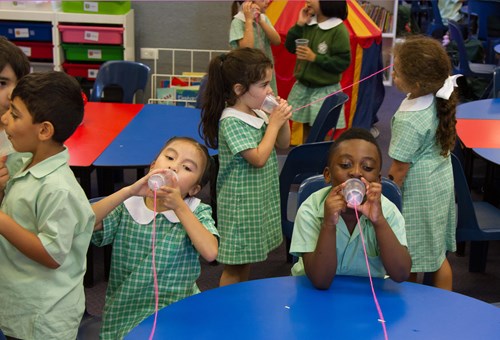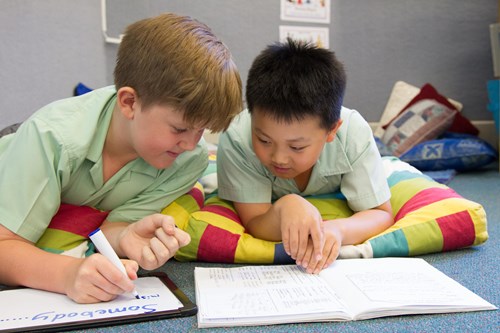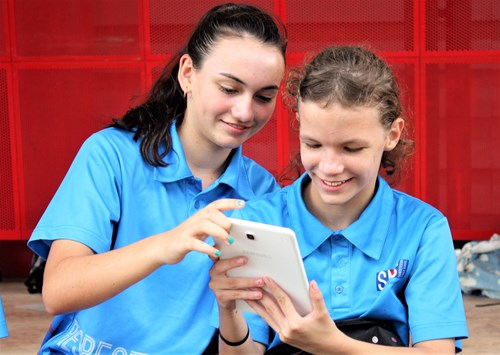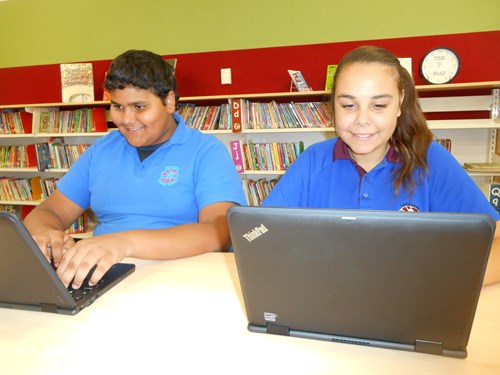Introduction
Dear colleagues,
This is the final report for 2017 and I would like to take the opportunity to wish everyone a safe, relaxing and restorative festive season.
Dr Fiona Mueller left her position as Director, Curriculum in November and I am sure I speak on behalf of staff and stakeholders in acknowledging what an impact she made on improving the learning of all young Australians in her time at ACARA. Her unwavering dedication to students at the centre of Curriculum’s work was inspirational for those who worked with her in the office and those in our many stakeholder groups.
The Curriculum unit at ACARA continues to support stakeholders in their implementation of the Australian Curriculum on request, while undertaking a program of research to inform future refinement of the curriculum. In October the unit hosted the annual meeting of Australian Alliance of Associations in Education (AAAE) at the ACARA Sydney office. This was an opportunity for representatives from a range of professional associations to provide input into some key questions about the purpose of curriculum and what students should learn.
ACARA’s Curriculum Directors’ meeting, hosted by the Department of Education in Hobart in late October, was complemented by a workshop on the Australian Curriculum Achievement Standards. The Curriculum Directors also explored those same key questions which will guide refinement of the Australian Curriculum.
A range of other curriculum activities are described in the reports below.
ACARA’s Aboriginal and Torres Strait Islander Education Taskforce and Advisory Group have been guiding the development of content elaborations for the Australian Curriculum: Science. Aboriginal science educator Joe Sambono from DET in Queensland has been working with the Curriculum Specialists in Science and in Aboriginal and Torres Strait Islander Education to write elaborations that are specific to the Aboriginal and Torres Strait Islander Histories and Cultures cross-curriculum priority. Consultation with key stakeholders and Aboriginal and Torres Strait Islander communities will occur over the course of 2018 before the elaborations and teacher background information are published.
Work is underway in reviewing the work sample portfolios for the Australian Curriculum: English. Many of the published work samples were collected when schools were in the early stages of implementing the curriculum, so a review is being undertaken to ensure the samples remain current and relevant. New content statements and aspects of the achievement standards which were developed as part of the review of the Australian curriculum are not necessarily represented in the work samples. After this review process the work sample portfolios will be updated. Some new work samples have already been collected through ACARA’s collaboration with the AISSA and these are being finalised for publication.
The Australian Curriculum’s General Capabilities attract considerable interest from international visitors to the website as well as individuals and groups who collaborate with ACARA’s Curriculum Specialists. Recent workshops have focused on Personal and Social Capability and Critical and Creative Thinking. An explanatory video about the General Capabilities is now available on the Australian Curriculum website.
To access this video, please go to the link below:
www.australiancurriculum.edu.au/f-10-curriculum/general-capabilities/
ACARA’s Curriculum Specialists for General Capabilities (Danielle Cavanagh) and Student Diversity (Robyn Copland) work with states and territories, on request, to support the use of the three-dimensional Australian Curriculum, and they welcome approaches from school authorities and other stakeholders. Where possible, this support should be made available to participants across sectors. For further information, please contact Danielle or Robyn using the contact list on the last pages of this report.
A draft case study and survey of HPE curriculum development in Australia was provided to the OECD as part of its Education 2030 project. Specific initiatives, including the draft Australian Student Wellbeing Framework Respectful Relationships - Educating against Domestic Violence, Healthy Eating in Schools, and the draft Physical Literacy Standards, have also been the subject of consideration and feedback from and potential collaboration with ACARA.
Groups of Catholic and government schools’ teachers in South Australia have produced work samples that link student learning, achievement standards and general capabilities to child safety. These work samples are being reviewed and annotated for possible inclusion on the Australian Curriculum website. A case study of this work will feature in an upcoming ACHPER conference and in a future edition of Primary Matters.
State and territory authorities and sectors continue to be supported in their implementation of the Australian Curriculum: HASS in F-6/7 and the 7-10 Australian Curriculum in History, Geography, Economics and Business, and Civics and Citizenship.
The report on student performance in the 2016 NAP Civics and Citizenship Sample test was released at the end of November. This report includes a chapter detailing ways in which the Australian Curriculum: Civics and Citizenship can support students in developing skills and knowledge in this area.
Development of work samples in 7-10 Economics and Business and in each of the F-6/7 HASS sub-strands continues along with a review of the existing work sample portfolios in History and Geography in F-6/7. The Curriculum Specialist, HASS continues to work with the Australian Taxation Office and the Australian Securities and Investments Commission in their production of resources to support students learning about consumer and financial literacy. These resources can be accessed via the Curriculum Connections section of the Australian Curriculum website.
The annotation of work samples for the first phase languages, Chinese, French, Indonesian, Italian and Japanese, is underway. The current focus is aligning the work samples to the achievement standards with annotations that clearly explain and corroborate evidence of achievement ‘at’ the standards. In October, ACARA’s Curriculum Specialist, Languages (Josephine Ardino) ran the first annotations workshop with teachers from Catholic, government and independent schools from the ACT, Northern Territory, Queensland, South Australia and Tasmania.
At the end of November Languages teachers from across the country will again be at ACARA’s Sydney office to participate in the second annotations’ workshop to complete the first phase of the project. Samples of work illustrating students’ achievement ‘at’ the standard will be published on the Australian Curriculum website in the 2018 academic year.
Planning is also underway for the collection of work samples for the second phase languages which include Arabic, German, Modern Greek, Spanish and Vietnamese. Workshops to support the development of assessment tasks that will generate work samples will recommence in term one of 2018. ACARA is very appreciative of the hard work and enthusiasm of teachers who have contributed so much energy and professional support to the project to date.
The Curriculum Specialist: Mathematics is collecting samples of student work from organisations and jurisdictions to enhance the current portfolios of student work located on the year-level pages of the Australian Curriculum: Mathematics. Work samples that are currently included in the portfolios are being reviewed for their depth, rigour and the range of aspects of the achievement standard demonstrated. The new portfolios will include work samples that will reflect quality assessment practices that enable students to demonstrate the depth of their knowledge and understanding. Some new work samples have already been collected through ACARA’s collaboration with the AISSA and are currently being finalised for publication.
The 2016-2017 report is in draft for the consideration of the ACARA Board. It is due to be published in early 2018. Of interest will be the responses to the focus on student diversity and how the Australian Curriculum is used to meet learners’ needs; and the extent to which the Cross-Curriculum Priorities are being implemented.
Following consultation with states and territories and national stakeholder groups, ACARA received recommendations for improvements to Version 1.1 of the National Literacy and Numeracy Progressions. These included changes to aspects of the structure of the progressions, expanding the progressions to ensure they were inclusive of all learners, improving the diagrams and minimising the use of technical terminology. Version 2.0 was approved by the ACARA Board on 19 October and will be submitted to Education Council in December for approval. It is anticipated that the progressions will be available as an online resource to support the Australian Curriculum in January 2018. The curriculum specialists for Mathematics (Margaret Bigelow) and English (Kim Reid) can be contacted for further information about the National Literacy and Numeracy Progressions.
ACARA’s Curriculum specialists Dr Caty Morris (Aboriginal and Torres Strait Islander Education) and Dr Rainer Mittelbach (Science) have been working in collaboration with Aboriginal science educator Joe Sambono from DET in Queensland in the development of new elaborations for the Australian Curriculum: Science, as outlined in greater detail in the section ‘Aboriginal and Torres Strait Islander Histories and Cultures’.
In October, jurisdictional feedback was collected and incorporated into the new assessment framework for the NAP Sample Science Literacy assessment. ACARA has conducted a small-scale pilot study with Year 6, Year 8 and Year 10 students from 58 schools across Australia to establish empirical evidence for the new draft assessment framework regarding the progression of knowledge and skills, the development of age-appropriate assessment items for Year 10 students, and the vertical linking of Year 6 and 10 assessments.
In November, work commenced on enhancing the portfolios of student work samples that are attached to the year-level achievement standards of the Australian Curriculum: Science. The work samples currently included are being reviewed for their depth, rigour and diversity. New work samples will be collected and published with the intention to highlight quality assessment practices of student learning that reflect the three-dimensional nature of the Australian Curriculum: Science and that enable students to demonstrate their science inquiry skills and their depth of conceptual knowledge and understanding.
ACARA’s curriculum work is assisted by the Students with Disability Advisory Group (SWDAG) with their final meeting being held on 5 December. The meeting will include shared examples of practice from members and the SWDAG research sub-group will be presenting their work on criteria for effective research.
Four new illustrations of practice (IoP) will be published on the Australian Curriculum website in the near future; these focus on differentiating the Australian Curriculums using the three-dimensional design to plan teaching and learning programs for students with disability. Whilst the IoPs are set in Special schools, the content can be applied across school settings, demonstrating explicit examples of curriculum differentiation.
In October ACARA’s Curriculum Specialists for Student Diversity (Robyn Copland) and General Capabilities (Danielle Cavanagh) presented at workshops for teachers attending the Queensland Curriculum and Assessment Conference ‘Navigating the Australian Curriculum and assessment for students with disabilities’. Curriculum Specialists work with states and territories on request, to support the use of the three-dimensional Australian Curriculum, and they welcome approaches from school authorities and, where possible, cross-sectoral agencies. For further information, please contact Danielle or Robyn using the contact list on the last page of this report.
Introductory workshops for the National Innovation and Science Agenda (NISA) school education project known as Digital Technologies in focus: Supporting implementation of Digital Technologies continue to be held around the country with the following locations included since our last report: Cairns, Lismore, Coffs Harbour, Ballarat, Shepparton, Newcastle, western Sydney, Armidale, Gunnedah, Parkes, Dubbo, Albury, Adelaide, Alice Springs and Darwin. There are now more than 150 schools working closely with ACARA Curriculum Officers to implement action research-type projects linked to the Digital Technologies curriculum. Professional learning and school visits are being planned for 2018.
ACARA hosted a discussion to explore how initial teacher education for the Technologies curricula can be updated and enhanced for primary and secondary education to reflect the intent of the Australian Curriculum: Technologies. Representatives from the following organisations were invited: Australian Councils of Deans from: Agriculture, Built Environment and Design, Education, Engineering, and Information and Communication Technology; the Australian Institute of Teaching and School Leadership (AITSL); the Australian Government Department of Education and national professional teaching associations. Recommendations and actions from this discussion will be shared with the ACARA Board and the STEM Partnerhips Forum.



